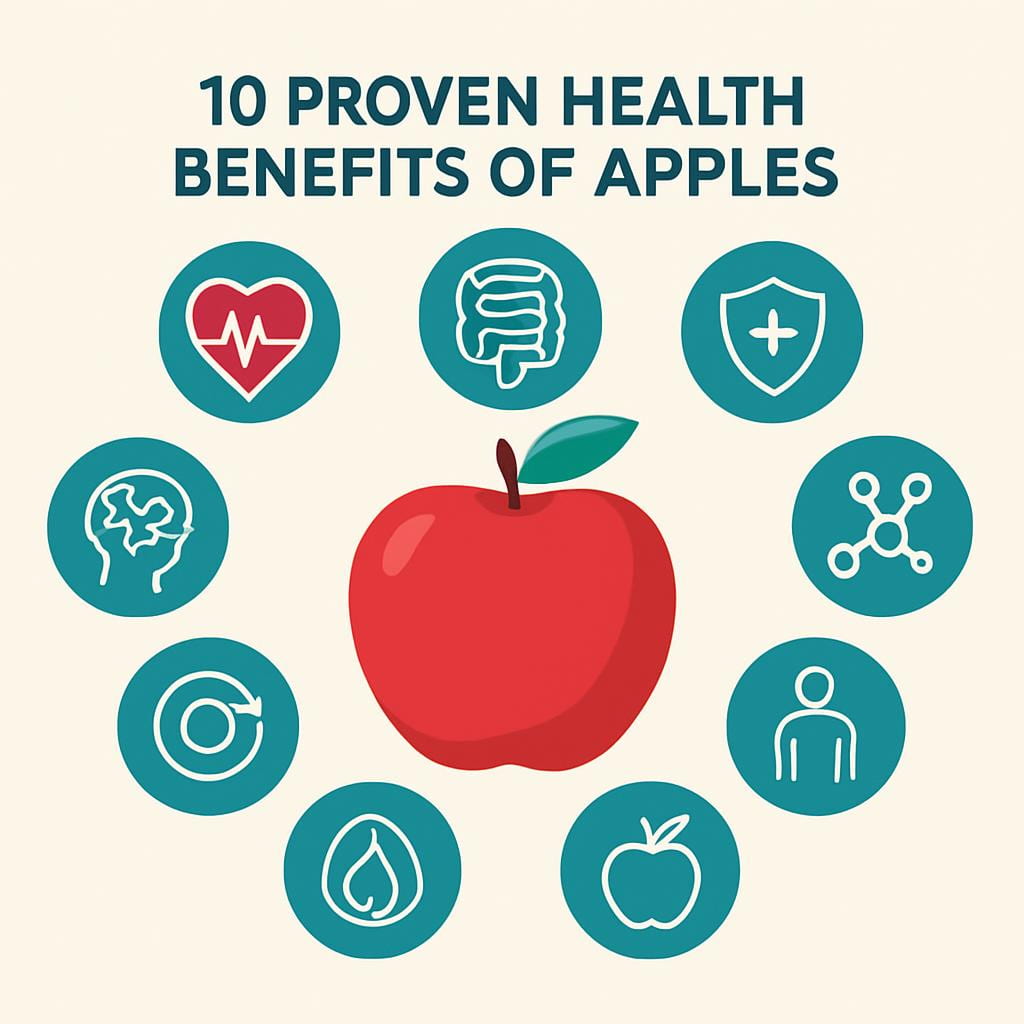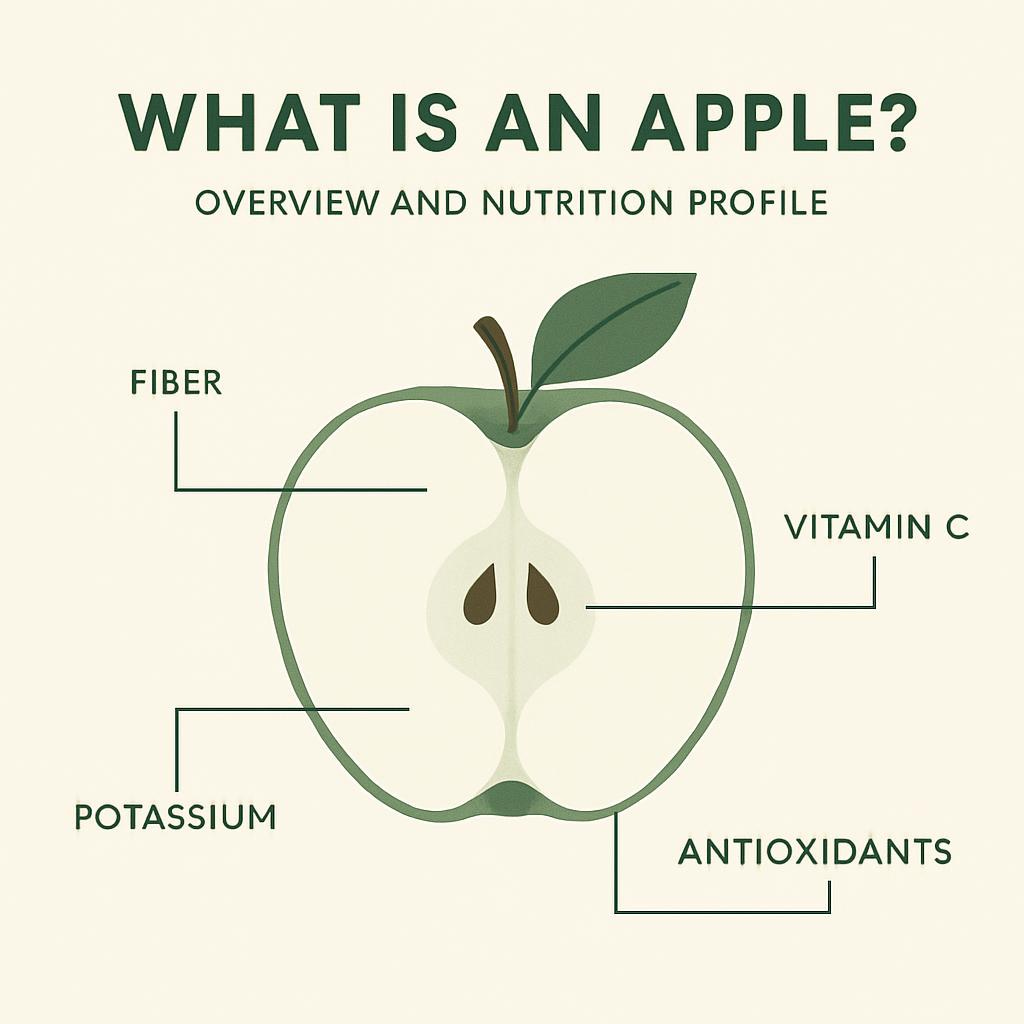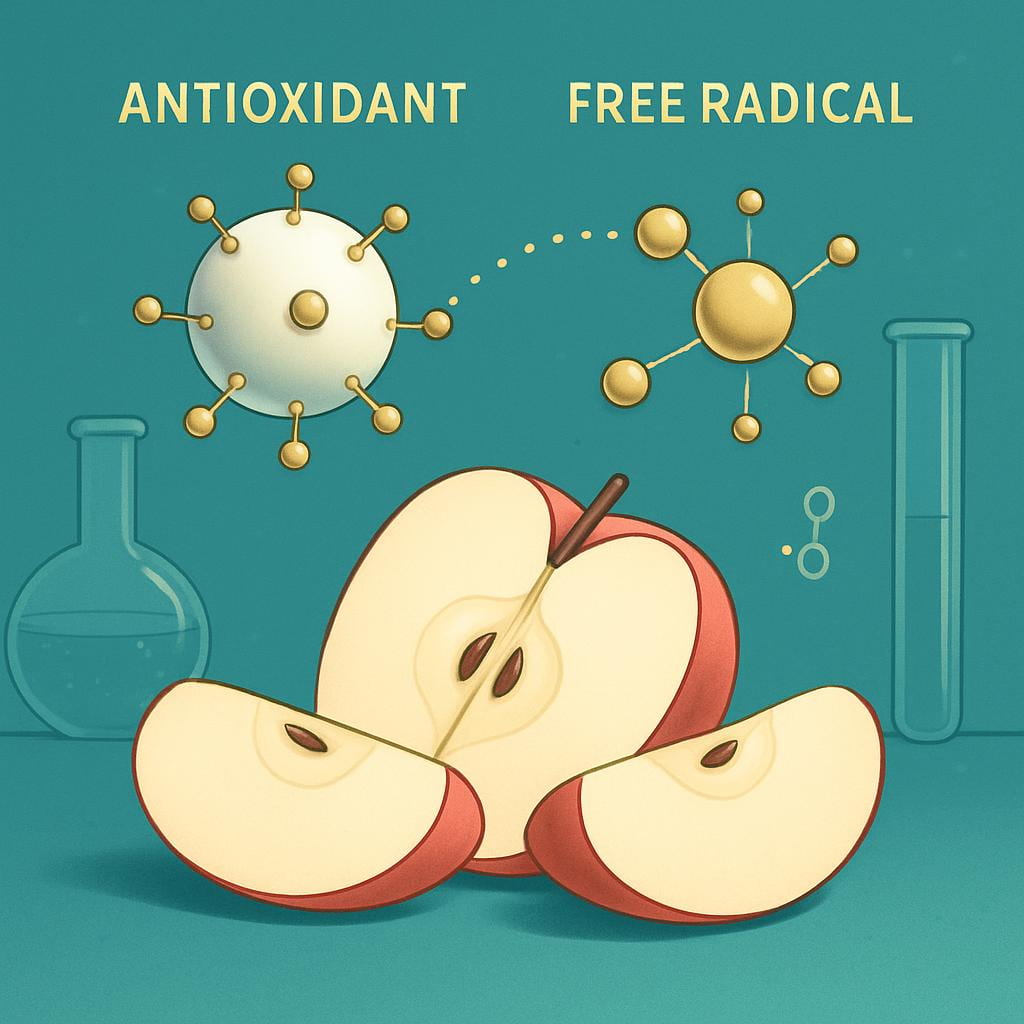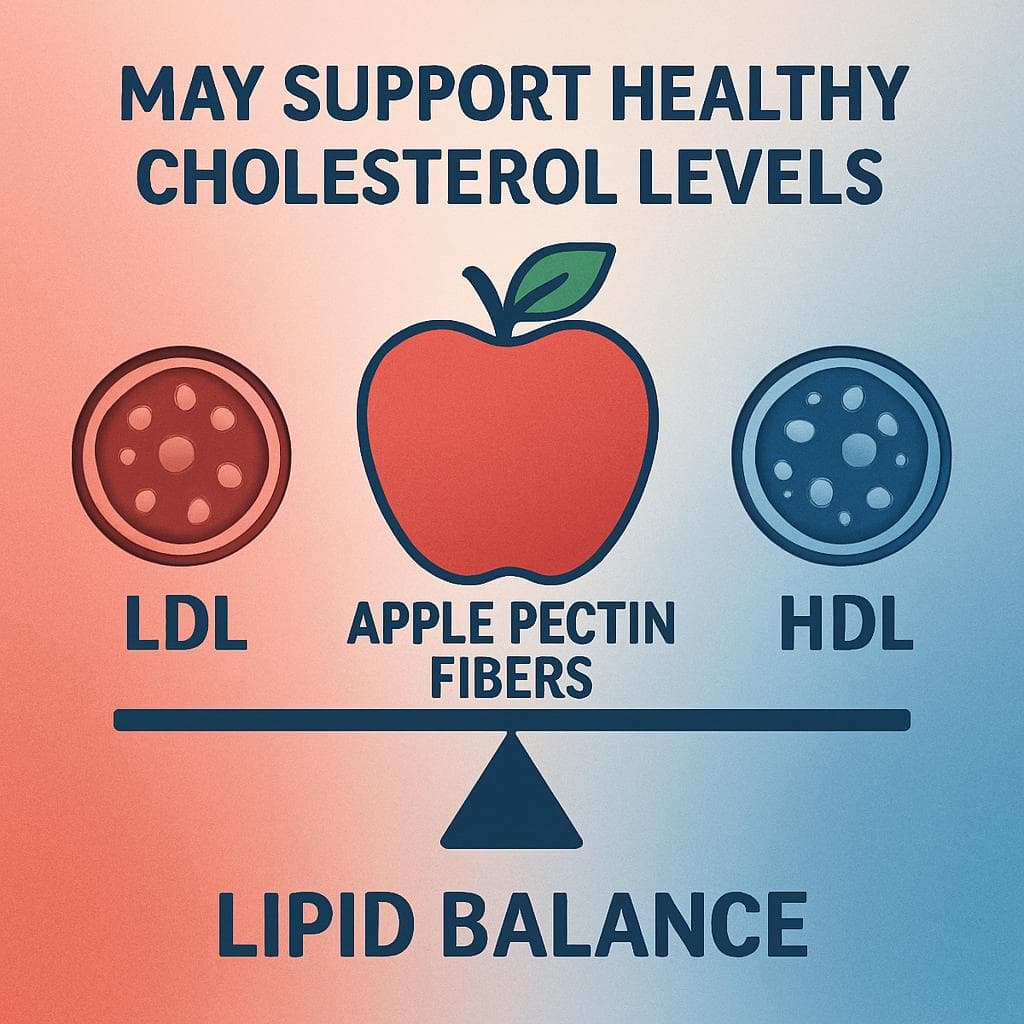Apples are packed with fiber, antioxidants, and vital nutrients that support overall wellness.
Regularly eating apples may help promote heart health, manage blood sugar levels, and support digestion. Understanding the nutritional and scientifically backed benefits of apples can help you make informed choices about incorporating this versatile fruit into your daily diet.

Apples are low in calories, rich in soluble fiber (pectin), and contain bioactive compounds like quercetin and chlorogenic acid—key to many of their studied health effects. According to the U.S. Department of Agriculture (USDA), one medium apple (about 182 g) provides roughly 52 calories, 4.4 grams of fiber, 14 % of the Daily Value (DV) for vitamin C, and 6 % DV for potassium.
What Is an Apple? (Overview and Nutrition Profile)
Apples (Malus domestica) are one of the world’s most widely consumed fruits—valued for their crisp texture, refreshing sweetness, and diverse nutritional profile. They belong to the Rosaceae family and come in hundreds of varieties, from tart Granny Smith to sweet Fuji and Gala, each offering slightly different flavor and nutrient compositions.
From a nutrition standpoint, apples are low in calories but high in water, fiber, and bioactive compounds such as polyphenols and flavonoids, which contribute to many of their health-supporting properties. They also contain vitamin C, potassium, and small amounts of B-vitamins, making them a well-balanced fruit choice for overall wellness.

Apple Nutrition Facts (Per 100 g of Raw Apple With Skin)
| Nutrient | Amount | % Daily Value* |
|---|---|---|
| Calories | 52 kcal | — |
| Water | ~86 % | — |
| Carbohydrates | 13.8 g | — |
| Total Fiber | 2.4 g | 9 % |
| Sugars (natural fructose, glucose, sucrose) | 10.4 g | — |
| Vitamin C | 4.6 mg | 5 % |
| Potassium | 107 mg | 2 % |
| Vitamin K | 2.2 µg | 2 % |
| Polyphenols | ~110–136 mg | — |
*Percent Daily Values are based on a 2,000-calorie diet.
Source: U.S. Department of Agriculture (USDA) – FoodData Central
10 Proven Health Benefits of Apples (Backed by Science)
Research consistently shows that apples are a nutrient-dense fruit that supports heart, gut, and metabolic wellness. From fiber-driven cholesterol support to antioxidant protection, here are ten evidence-based ways apples may help promote long-term health.
1. Supports Heart Health

Apples are linked to better cardiovascular outcomes due to their soluble fiber (pectin), which may help reduce LDL (“bad”) cholesterol and improve vascular health. Pectin binds with cholesterol in the digestive tract, promoting natural elimination.
A 2024 clinical trial published in Food & Function found that anthocyanin-rich apple varieties improved endothelial function—a key marker of cardiovascular wellness. Similarly, the American Heart Association (AHA) encourages consuming fruits high in fiber and polyphenols as part of a heart-healthy diet.
2. May Help Regulate Blood Sugar

Apples have a low glycemic index (GI) and are naturally rich in soluble fiber (pectin), which slows digestion and supports more stable blood sugar levels after eating. When consumed with the skin, apples provide both soluble and insoluble fiber that work together to support steady glucose absorption and reduce sharp post-meal spikes.
Evidence from a large prospective cohort study published in the BMJ found that individuals who regularly consumed whole apples had a significantly lower risk of developing type 2 diabetes compared to those who consumed fruit juice. Researchers attribute this difference to the presence of fiber and polyphenols in whole apples, which are largely lost during juice processing.
3. Aids in Healthy Weight Management

Because apples are low in calories and high in water and fiber, they can support natural appetite control. Their bulk and fiber content promote fullness without excess calories, helping you eat more mindfully.
The Harvard T.H. Chan School of Public Health notes that fiber-rich foods like apples support satiety and balanced calorie intake, making them a smart snack between meals. Having an apple before lunch or dinner may help reduce overall food consumption in a sustainable way.
4. Supports Gut Health and Digestion

Apples contain pectin, a fermentable soluble fiber that acts as a prebiotic, nourishing beneficial gut bacteria such as Bifidobacteria. A balanced gut microbiome supports digestion, immunity, and nutrient absorption.
A 2023 systematic review in Nutrition Research Reviews reported that apple pectin enhances gut microbial diversity and helps maintain healthy lipid and glucose levels. Regular apple intake may therefore support digestive comfort and overall gut balance.
5. Provides Antioxidant Protection

Apples are naturally rich in quercetin, catechin, chlorogenic acid, and other polyphenols that help neutralize free radicals and reduce oxidative stress. These compounds play a role in protecting cells from everyday metabolic damage.
A 2024 review in Frontiers in Nutrition found that diets high in flavonoids, particularly from apples and berries, were linked to improved cardiovascular resilience and may support healthy aging. Antioxidant-rich fruits like apples are a valuable part of any balanced diet.
6. May Support Healthy Cholesterol Levels

The soluble fiber in apples—especially pectin—binds with cholesterol in the intestinal tract, helping the body remove it through waste. Over time, this may contribute to improved LDL-to-HDL balance.
According to data from the U.S. Department of Agriculture (USDA) and the National Institutes of Health (NIH), diets high in soluble fiber (5–10 g/day) can reduce LDL cholesterol by about 5 %. Including apples regularly provides a natural way to meet these fiber goals and support cardiovascular health.
7. Promotes Hydration and Skin Wellness

Composed of about 86 % water, apples help maintain hydration while providing small amounts of vitamin C and plant antioxidants that support skin structure.
Vitamin C contributes to normal collagen formation, which supports skin elasticity and wound healing. According to the National Institutes of Health Office of Dietary Supplements, regular intake of vitamin C-rich foods like apples supports connective tissue health and natural antioxidant defense.
8. Supports Immune Function

Apples contain a blend of vitamin C, antioxidants, and natural phytonutrients that support the body’s normal immune defenses. These compounds work together to help protect cells from oxidative stress, maintain immune balance, and contribute to overall nutritional wellness.
According to the Centers for Disease Control and Prevention (CDC), healthy eating patterns rich in fruits and vegetables help people strengthen their immune systems, live longer, and reduce the risk of chronic diseases. Apples fit seamlessly into this approach because they supply small but valuable amounts of vitamin C, fiber, and antioxidant compounds that help support the body’s natural protective functions.
9. May Contribute to Longevity and Overall Wellness

Observational studies indicate that diets abundant in flavonoid-rich fruits, including apples, are linked with a lower risk of chronic diseases such as cardiovascular disease and certain metabolic disorders.
A 2024 meta-analysis published in the European Journal of Nutrition concluded that flavonoid intake is associated with reduced all-cause mortality, likely due to their antioxidant and anti-inflammatory roles. Apples, being widely accessible and nutrient-dense, may therefore play a supportive role in lifelong wellness and vitality.
10. Easy to Add to a Balanced Diet

Apples are one of the most versatile and accessible fruits to include in a balanced eating plan. They fit easily into breakfast, snacks, or desserts—providing fiber, hydration, and natural sweetness without added sugar.
You can:
- Enjoy apples fresh or sliced into salads, oatmeal, or yogurt parfaits for added flavor and nutrients.
- Pair an apple with nut butter or Greek yogurt to balance carbohydrates with protein and healthy fats.
- Bake apples with oats, cinnamon, and nuts for a wholesome, nutrient-dense dessert or breakfast option.
For best results:
- Eat apples with the skin on, since most antioxidants and fiber are concentrated in the peel.
- Choose whole apples over juice to maintain fiber and promote steady blood sugar control.
- Store apples in a cool, dry place or the refrigerator to preserve freshness, texture, and nutrient quality.
For safe handling, washing, and storage of fresh produce, follow the official U.S. Food and Drug Administration (FDA) – Selecting and Serving Produce Safely guidelines. The FDA advises rinsing apples under running water (without soaps or detergents) and drying them with a clean cloth or paper towel before eating to reduce potential surface contaminants.
Possible Side Effects and Precautions
While apples are widely recognized as a safe and nutritious fruit, some individuals may experience mild sensitivities or need to take precautions depending on their health status and dietary needs.
1. Pesticide Residue and Washing Tips
Apples may contain trace pesticide residues from surface spraying, but simple washing can greatly reduce them. The U.S. Food and Drug Administration (FDA) recommends rinsing apples under cool running water—without soap, bleach, or chemical washes—and gently scrubbing with a clean produce brush.
Peeling can lower residues further but also removes beneficial fiber and antioxidants in the skin. For best results, wash apples just before eating and store separately from raw meat to prevent cross-contamination.
2. Digestive Sensitivity and Fiber Tolerance
Apples are high in dietary fiber (about 4–5 grams per medium apple). While this supports digestion, excessive intake—especially in those not accustomed to high-fiber diets—may cause bloating or mild gas. Gradually increasing fruit and water intake helps the digestive system adjust comfortably.
3. Apple Juice vs. Whole Fruit
Whole apples offer fiber, satiety, and steady sugar absorption, while apple juice lacks fiber and can cause faster blood sugar spikes. The Centers for Disease Control and Prevention (CDC) recommends choosing whole fruits over juice for both children and adults to support balanced nutrition and healthy weight.
4. Fruit Juice Guidance for Infants and Children
The American Academy of Pediatrics (AAP) advises that fruit juice should not be given to infants under 12 months, and older children should consume only limited quantities of 100% fruit juice as part of a balanced diet. Whole apples, cut into age-appropriate pieces, are a safer and more nutrient-dense choice.
How to Choose and Store Apples Safely
Proper selection and storage help preserve apples’ freshness, flavor, and nutrient value while minimizing spoilage and contamination risk.
1. Selecting Quality Apples
Choose apples that are firm, unbruised, and free from cuts or soft spots. A healthy apple should feel heavy for its size and emit a mildly sweet aroma. Avoid fruit with mold or excessive blemishes, as these can indicate spoilage.
2. Storage Temperature and Conditions
According to the U.S. Department of Agriculture (USDA) Food Safety and Inspection Service, fresh apples should be stored at or below 40 °F (4 °C) in the refrigerator’s crisper drawer to slow ripening and bacterial growth. Whole apples kept at room temperature are best consumed within 5–7 days.
3. Washing and Handling
The FDA’s Selecting and Serving Produce Safely Guide recommends washing apples under clean running water before eating, cutting, or cooking. Do not use soap, detergent, or bleach. Always wash hands, utensils, and cutting boards before and after handling produce to prevent cross-contamination with raw meat, poultry, or seafood.
4. Safe Preparation Practices
If slicing apples in advance, sprinkle with lemon juice or ascorbic acid to prevent browning. Store cut apples in airtight containers in the refrigerator and consume within 2–3 days for best quality.
Frequently Asked Questions (FAQs)
1. Are apples good for weight loss?
Yes. Apples are low in calories and high in fiber and water, which promote fullness and help regulate appetite naturally.
2. Should I peel apples before eating?
It’s best to eat apples with the skin, as most fiber and antioxidants are concentrated there. Wash thoroughly before consuming.
3. Can apples raise blood sugar?
Whole apples have a low glycemic index and may support steady blood sugar levels. Apple juice, however, lacks fiber and can cause quicker spikes.
4. How many apples can I eat daily?
One to two medium apples per day fit comfortably into a balanced diet for most healthy adults.
5. Are organic apples safer than conventional ones?
Organic apples tend to have lower pesticide residues, but both types are safe when properly washed under running water.
6. Can children eat apples every day?
Yes. For children, sliced or cooked apples make a nutritious, fiber-rich snack—just ensure portions are age-appropriate to avoid choking hazards.
7. Are cooked apples still healthy?
Yes. While cooking slightly reduces vitamin C, baked or stewed apples still retain most fiber and beneficial polyphenols.
Conclusion
Apples are a nutrient-dense, fiber-rich fruit that supports heart, gut, and metabolic wellness when eaten regularly as part of a balanced diet. Choosing whole apples—with the skin—provides maximum nutritional value, while safe storage and washing practices ensure food safety.
From promoting digestion to supporting immune balance and hydration, apples remain a simple, accessible way to enhance your overall health naturally.
This content is for informational purposes only and not medical advice.
References:
